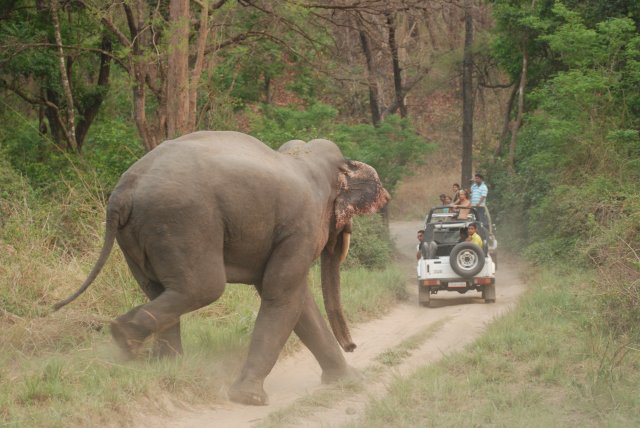
While leopards are attacking women and children for food in the higher reaches of this small mountain state, in the lower tracts villagers are fighting a losing battle with herds of wild elephants as the pachyderm raid the fields and graze whatever is grown on it. With the shrinking of their habitats and movement from one forest division to another stopped because of construction in their corridors, they are left with no alternative but to go to villages in search of fodder.
Apparently it is a bit too late now, and even as conservationists are crying foul and clamoring for creating green infrastructure so that the wildlife movements are not disturbed, but in Uttarakhand apparently it is a bit too late. Being a remote part of Uttar Pradesh earlier, bureaucrats sitting in their air conditioned offices gave nods to various projects without bothering a fig for the wildlife.
The tables are now turned as the wildlife is caring a fig for human beings.
There is almost no day in the higher reaches of this small mountain state when a leopard does not attack a woman or a child. In most cases they succumb to the attacks and some part of the body is eaten, the few who do manage to escape to narrate their say do not go out in the open again after dark. In certain areas, the animals have imposed curfew as there is no human movement after dusk, fearing that the felines may strike.
As various projects are coming up in the hills, including hydel power projects and roads are being made to provide better communication network, the forests are shrinking and with it the herbivore population that the carnivores feed on. Added to this is human interference in the forests for fuel wood and fodder forcing the leopards to turn to village dogs and cattle and attacking women and children for food.
In the plains the story is different. If it is leopards in the higher reaches, it is the elephant herds in the plains. Villagers along the Rajaji National Park, Corbett National Park and various forest divisions in Uttarakhand have stopped cultivating their land as pachyderm herds invade the fields and graze upon whatever is grown. Villagers throw boiling water on them or fire crackers to scare them, but this only makes them bolder and even turns some into rogues, who attack men.
The state forest department has tried everything to stop the elephants from coming to the villagers in search of fodder but have failed miserably. They have even advised the farmers to take to cultivation of chilies as the pachyderm do not eat them, but villagers have not taken to the proposal. The department has now written to the centre proposing the construction of broad deep trenches so that the elephants cannot cross them and enter villages.
Chief Wildlife warden S K Dutta said that a proposal has been sent to the centre under project elephant for the necessary funds to dig broad and deep trenches along the border of forests and villages and also along the highways to prevent the elephants from entering villages and causing damage to crops, or attacking vehicles on the roads. Directions have also been sent to the concerned forest divisions to study the elephant sensitive areas in their jurisdiction, he added.
However, informed sources said that the man-animal conflict, especially in relation to elephants had taken serious proportions, as villagers were approaching the forest department almost every day asking for compensation for the crop that is destroyed by the pachyderm, which in turn put pressure on the state government. If the centre refuses to fund the proposal, the department will be forced to ask the state government for funds to undertake the exercise”, they claimed.
But it is quite apparent the neglect of the corridors and movement of wildlife while sanctioning various developmental projects in the hill districts of what was earlier Uttar Pradesh and now called Uttarakhand is telling upon the authorities. Perhaps even now if they see sense and stop the blatant construction in forests and corridors, and take to creation of green infrastructure things could perhaps improve, otherwise it is death knell for both humans and animals.
Image: WikiCommons
A journalist with over 40 years of experience, Jagdish Bhatt was Editor, Hill Post (Uttarakhand).
Jagdish had worked with India’s leading English dailies, which include Times of India, Indian Express, Pioneer and several other reputed publications. A highly acclaimed journalist, he was a recipient of many awards
Jagdish Bhatt, aged 72, breathed his last on 28th August 2021 at his Dehradun residence.




You are spot on Mr Jagdish Bhatt.The over all situation is alarming.
Count down against humans/human habitat has indeed begun !
Nothing seems to impact the political class The Forest Department live in their own’ pre-independence world’.I urge the Chief Minister to accord top priority to this aspect.